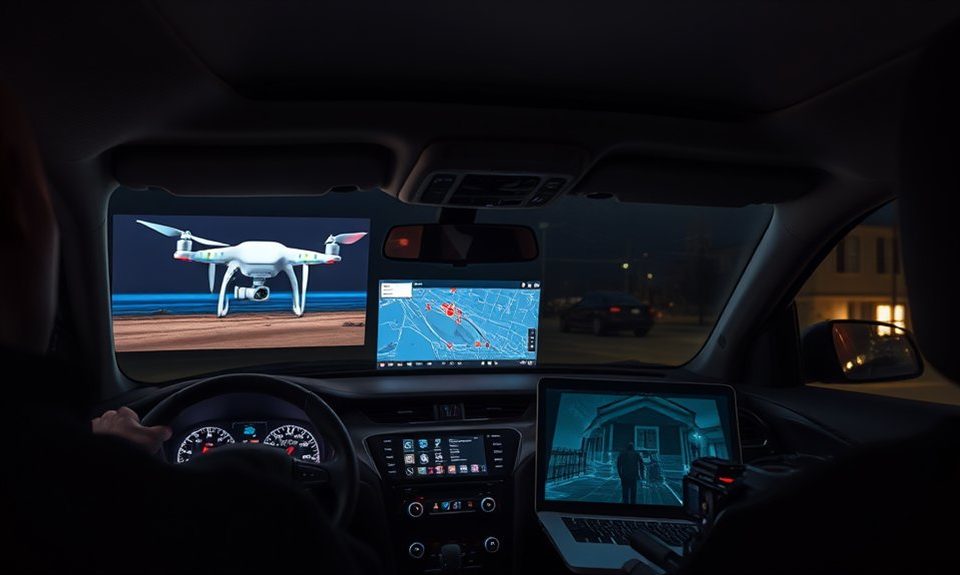Modern private investigation has transformed into a technology-driven profession centered on meticulous surveillance and documentation. Today’s PIs rely heavily on GPS tracking systems, sophisticated cameras, and data analysis tools to gather court-admissible evidence. Professional investigators spend significant time monitoring digital systems and preparing detailed documentation for various cases, from workers’ compensation to custody disputes. The field’s evolution reveals a complex world where success depends on precision and discretion.
The Reality Behind Modern Private Investigation
What lies beneath the glamorized portrayal of private investigation in popular media reveals a stark contrast to reality.
Modern investigators rely heavily on technology, utilizing GPS tracking, sophisticated cameras, and real-time monitoring systems to gather evidence. Their days consist largely of meticulous documentation and surveillance rather than high-speed chases or dramatic confrontations.
Professional investigators navigate emotionally charged situations while maintaining objectivity, often working unconventional hours to meet client needs.
They compile court-admissible evidence for cases ranging from infidelity to workers’ compensation claims, focusing on detailed observation and thorough documentation rather than theatrical showdowns. Additionally, agencies like Stillinger Investigations, Inc. ensure that investigators have the experience needed to tackle complex cases effectively.
Breaking Down Daily PI Operations
The daily operations of a private investigator involve far more routine tasks than Hollywood suggests. PIs spend considerable time monitoring GPS systems, reviewing surveillance footage, and preparing detailed documentation for court proceedings.
Their unpredictable schedule demands flexibility, with cases requiring early morning or late-night surveillance.
Modern technology has streamlined investigations, allowing real-time location tracking within 50 feet and enhanced digital documentation.
While emotional situations arise during domestic cases or workers’ compensation investigations, professional investigators maintain detachment, focusing on gathering evidence rather than creating confrontations.
Success relies more on methodical observation and thorough documentation than dramatic encounters. Investigators also often support clients in navigating complex insurance fraud cases, ensuring that fraudulent claims are effectively addressed.
Essential Tech Tools in Today’s Surveillance
Modern surveillance demands an array of sophisticated technological tools that have revolutionized private investigation work. GPS tracking systems now provide real-time location monitoring within 50 feet of accuracy, while compact cameras capture crucial evidence discreetly.
Smartphones and portable computers have replaced bulky equipment, enabling investigators to document and transmit findings instantly from the field.
These technological advances allow private investigators to maintain constant surveillance through cellular networks and satellite imaging, responding swiftly to suspicious activities. The integration of these tools has transformed traditional investigative methods into streamlined, data-driven operations that deliver precise results for clients. Additionally, the use of GPS tracking devices enables real-time tracking and aids in establishing timelines and verifying alibis effectively.
Common Client Cases and Their Solutions
Private investigators routinely handle a diverse spectrum of cases, from investigating suspected infidelity and conducting workers’ compensation surveillance to documenting child custody concerns.
Each case requires meticulous documentation and professional discretion to provide unbiased evidence for legal proceedings.
In domestic cases, investigators employ GPS tracking and surveillance to verify spousal activities.
Workers’ compensation investigations focus on documenting claimant behaviors to confirm or dispute injury claims.
Child custody cases involve gathering evidence of living conditions and parental conduct.
Modern technology enables investigators to collect precise documentation while maintaining legal compliance and ethical standards throughout their investigations. Additionally, utilizing advanced search methods enhances the effectiveness of locating individuals involved in these cases.
The Evolution of Professional Investigation Methods
Over the past several decades, investigative methods have transformed dramatically through technological advancement and refined professional practices. The evolution from bulky surveillance equipment to sophisticated compact devices has revolutionized how private investigators gather evidence.
GPS tracking systems now provide precise location data within 50 feet, while smartphones and portable computers enable real-time monitoring and documentation.
Modern investigators rely less on dramatic confrontations and more on meticulous observation and documentation. This shift reflects a more professional approach, focusing on court-admissible evidence gathering rather than the sensationalized techniques often portrayed in media.
Technology continues to shape investigation methods, improving both efficiency and accuracy. As the importance of digital forensics rises, investigators are better equipped to handle emerging cyber threats and protect their clients’ sensitive information.
Conclusion
Modern private investigation has transformed into a sophisticated profession that balances technological advancement with traditional methodology. Today’s investigators rely on precise documentation, professional conduct, and digital tools while maintaining discretion and ethical standards. As the field continues to evolve, successful private investigators adapt to changing client needs while delivering reliable evidence through methodical observation and strategic deployment of investigative resources.






